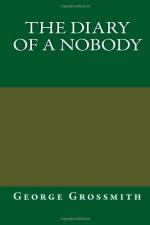Got back early to give time to dress, which we received a telegram instructing us to do. I wanted Carrie to meet me at Franching’s house; but she would not do so, so I had to go home to fetch her. What a long journey it is from Holloway to Peckham! Why do people live such a long way off? Having to change ’buses, I allowed plenty of time—in fact, too much; for we arrived at twenty minutes to seven, and Franching, so the servant said, had only just gone up to dress. However, he was down as the clock struck seven; he must have dressed very quickly.
I must say it was quite a distinguished party, and although we did not know anybody personally, they all seemed to be quite swells. Franching had got a professional waiter, and evidently spared no expense. There were flowers on the table round some fairy-lamps and the effect, I must say, was exquisite. The wine was good and there was plenty of champagne, concerning which Franching said he himself, never wished to taste better. We were ten in number, and a menu card to each. One lady said she always preserved the menu and got the guests to write their names on the back.
We all of us followed her example, except Mr. Huttle, who was of course the important guest.
The dinner-party consisted of Mr. Franching, Mr. Hardfur Huttle, Mr. and Mrs. Samuel Hillbutter, Mrs. Field, Mr. and Mrs. Purdick, Mr. Pratt, Mr. R. Kent, and, last but not least, Mr. and Mrs. Charles Pooter. Franching said he was sorry he had no lady for me to take in to dinner. I replied that I preferred it, which I afterwards thought was a very uncomplimentary observation to make.
I sat next to Mrs. Field at dinner. She seemed a well-informed lady, but was very deaf. It did not much matter, for Mr. Hardfur Huttle did all the talking. He is a marvellously intellectual man and says things which from other people would seem quite alarming. How I wish I could remember even a quarter of his brilliant conversation. I made a few little reminding notes on the menu card.
One observation struck me as being absolutely powerful—though not to my way of thinking of course. Mrs. Purdick happened to say “You are certainly unorthodox, Mr. Huttle.” Mr. Huttle, with a peculiar expression (I can see it now) said in a slow rich voice: “Mrs. Purdick, ‘orthodox’ is a grandiloquent word implying sticking-in-the-mud. If Columbus and Stephenson had been orthodox, there




